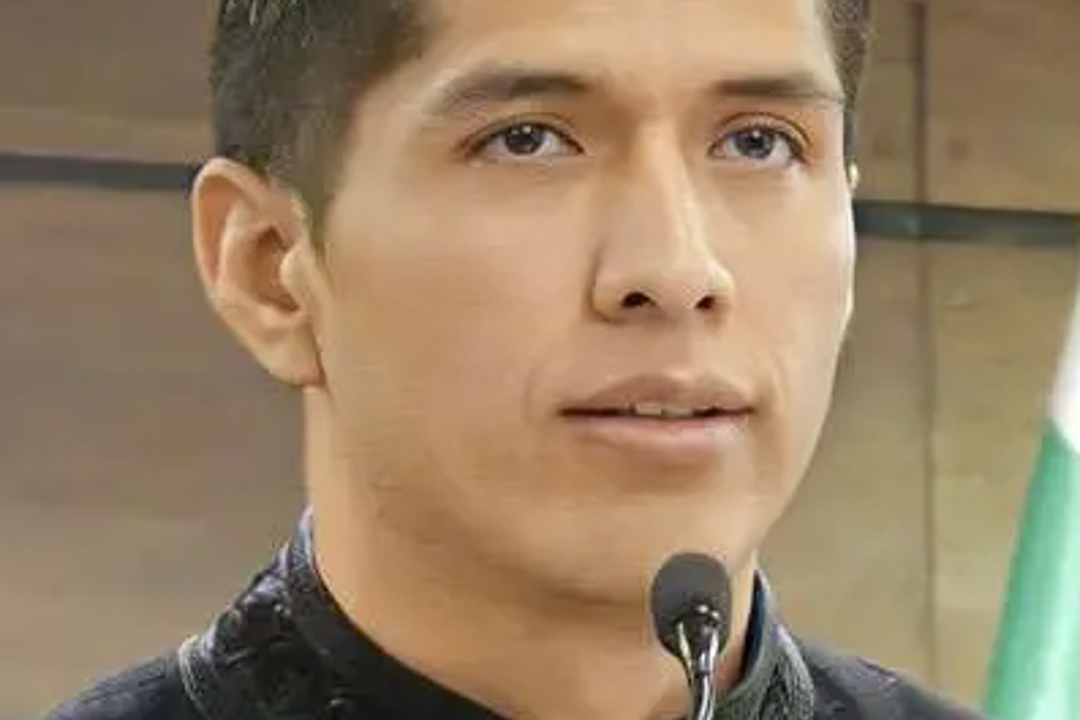
Andrónico Rodriguez's speech
Good afternoon to everyone present, to the listeners, and to all the leaders of the different political organizations. A warm greeting.
I am here not as a candidate, because I am not one. I bring no recipes or definitive solutions to the problems of the crisis. I have come to share ideas, perspectives, and a vision for the country. I have come to share some contradictions with a self-critical lens, but also to present positions regarding the current situation and the economic crisis that is, quite frankly, taking us to what seems like a bottomless cliff.
Bolivia has a geographical area of approximately 1,098,000 square kilometers. We have 112 provinces, 340 municipalities, and an estimated population of 12 million people. Our nominal GDP, or the size of our economy, is around 40 billion dollars. The GDP per capita is approximately 700 dollars.
We have renewable and non-renewable natural resources. We have absolutely everything. As some great Indigenous intellectuals would say, Bolivia is sitting on a throne of gold… but it does not know what it's for. I say this with complete self-criticism.
In the last 40 years, our country has experienced two very different economic models. After regaining democracy from the military dictatorship in the 1980s, following Hernán Siles Zuazo’s administration, a largely privatization-driven economic model was implemented. We know the consequences: while hyperinflation was reduced, the social cost was extremely high, generating significant inequality, poverty, and unemployment.
After 20 years without major progress, the MAS-IPSP came to power, implementing a plural economic model that includes the public, private, community, and cooperative sectors. A model that many economists describe as statist and centralized, but with important and visible achievements up until 2019.
Currently, under the current government, in my view, the model has been reduced to only the public sector. We have shifted to a managerial and entrepreneurial State, almost paternalistic, that monopolizes all areas of economic activity, leaving behind the strengthening of private initiatives, community economies, and cooperativism. This is deeply concerning.
The question now is: Has the MAS's plural model failed? We’ve gone through two distinct models: from 1985 to 2005, and from 2006 to 2019. If the population were to weigh both periods, they might ask: In which era did we live better?
But the underlying issue, in my opinion, is that poor political decisions generally lead to serious economic consequences.
In 2019, after the serious political conflict, a right-wing transitional government took power. Part of the country celebrated, believing that it was finally free from "Masismo," from "socialism," from "the regime." They celebrated for an entire year. However, that government did not succeed. Then, the MAS-IPSP won again. The other half of the country celebrated, believing that now the economy would be rebuilt. But four years later, we are in the same situation.
So, what is happening? In politics, there is a lack of tolerance, and in economics, a lack of planning. We have become accustomed to resolving our political differences in the streets, competing to see who shouts the loudest, who has the biggest shock group. We have forgotten understanding, patience, and tolerance.
These confrontations have had unimaginable economic consequences. Today, our international reserves are at historically low levels. Lithium has not taken off since 2019. Debt and state subsidies continue to grow. Oil revenue has fallen below 2 billion dollars. Tax revenues reach 57 billion bolivianos, and customs about 18 billion. Without urgent measures, we will not be able to stabilize the country.
We are fighting over ideological differences instead of seeking joint solutions.
In light of this situation, I propose at least six urgent tasks from the central level to redirect the economy:
-
Facilitate, innovate, and improve the working and business conditions of the informal sector, which represents 60-70% of the population. Many work with small capital and no prospects for growth due to bureaucracy and state neglect.
-
Promote the energy and strategic minerals sectors, fundamental pillars of our economy, adapting them to technological development and artificial intelligence. They must be national priorities.
-
Renew major strategic state-owned companies. The State should not compete with entrepreneurs or monopolize all productive spaces. It must focus on key areas such as the energy transition.
-
Strengthen key sectors such as agriculture, livestock, tourism, and transportation, mainly managed by private entities and entrepreneurs. The State must ensure legal security and facilitate conditions through new laws or tax reforms.
-
Build an economy for those with the least. We must continue implementing productive social programs, especially in rural areas where access to drinking water, education, and healthcare is still lacking.
-
Recover economic stability. This is not about demagogic speeches or improvised measures. What is needed is trust, institutional integrity, and a new economic plan.
At this moment, we are experiencing profound institutional breakdown. Politics is devalued, politicians discredited, and the economic crisis is consuming us.
It seems that the extremes are harming us. On one side, there are calls to eliminate the "Masistas," and on the other, the "neoliberals." This is not how we are going to build a country. Political and ideological differences will always exist. But if we do not make decisions with a vision for the country and respect for our geographic and cultural reality, we will not move forward.
We can be leftist in political and social matters, but in macroeconomics, we must open ourselves to the world. Neither Venezuela nor the United States are models that can be directly applied. Bolivia needs to deepen its plural economy—public, private, community, and cooperative—in line with its diverse reality.
Finally, we must reassess how we evaluate public management. It is not enough to say that someone is a good mayor because they execute 99% of their budget. What projects were carried out? Were they necessary? We have bridges without rivers, markets in communities of 50 people. We lack planning. Planning must become a national trait of all Bolivians, regardless of ideology.